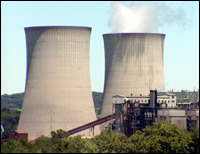A river downstream of a privately-owned nuclear fuel processing plant in East Tennessee is contaminated with enriched uranium, according to an interim report [PDF] by a university scientist that was released last week.
The contamination was found in the Nolichucky River and Davy Crockett Lake near Nuclear Fuel Services (NFS) plant in Erwin, Tenn. The plant, which produces nuclear fuel for the U.S. Navy and also processes weapons-grade uranium into fuel for nuclear power plants, has a history of serious safety problems.
The Nolichucky drains the Blue Ridge Mountains of western North Carolina and eastern Tennessee and provides drinking water for Tennessee communities including Greeneville. There are no known sources of enriched uranium in the area other than NFS.
The research was conducted without compensation by Michael Ketterer, a chemistry professor at Northern Arizona University who specializes in uranium contamination, at the request of the Sierra Club Christian Peacemakers Teams. While uranium can occur naturally, Ketterer found ratios of various forms or isotopes of uranium downstream of NFS that indicate enriched uranium has escaped from the plant into the environment, most likely via groundwater.
“We do see ratios systematically higher than occur in nature far downstream from the Nuclear Fuel Services facility,” he said.
For example, the typical ratio of Uranium-235 to Uranium-238 found in nature is 0.00725, but the ratio in Nolichucky sediment and water is 0.015. Ketterer’s team also found that mollusks in Davy Crockett Lake, a popular fishing spot on the Nolichucky, show uranium signatures that matched those in the water.
The concentrations of enriched uranium that Ketterer found are low and do not exceed federal drinking water standards. But as Ketterer pointed out during a press conference last week, the federal water discharge permit for NFS says the facility is not supposed to be releasing any enriched uranium.
Ketterer presented his findings to the Nuclear Regulatory Commission (NRC) last week during a public hearing about a proposed 40-year license renewal for the NFS facility, the Greeneville Sun reported.
Hartwell Carson, the French Broad Riverkeeper with the Western North Carolina Alliance, assisted Ketterer with his research. During last week’s press conference, Carson said the study “only scratched the surface of what’s out there and found widely dispersed enriched uranium in the environment,” which wasn’t previously known. Carson also raised concerns that there could be contamination hot spots that have not yet been discovered.
Ketterer agreed that the findings point to the need for further research. He said he was struck by the lack of information in the public record about environmental contamination from the NFS facility.
In 2006, there was a leak of highly enriched uranium from the NFS plant. In response, the NRC issued an order modifying the company’s special nuclear materials license that cited a “deficient safety culture” at the facility, the Knoxville News-Sentinel reported in 2007.
The order detailed six instances in 2005 and 2006 in which NFS personnel violated NRC regulations. The spill itself resulted in eight separate violations, including failure to notify NRC in a timely manner, and failure to meet safety requirements for a critical accident, which could lead to the release of a deadly amount of radiation.
In 2006, the NFS facility also failed to meet performance requirements in an exercise designed to test a plant’s response to an attack, and there were three instances in 2005 and 2006 where the company failed to secure special nuclear material.
NFS is a subsidiary of the Charlotte, N.C.-based Babcock and Wilcox Co., which provides design, engineering, construction, and management services for nuclear power plants.
(This story originally appeared at Facing South.)



